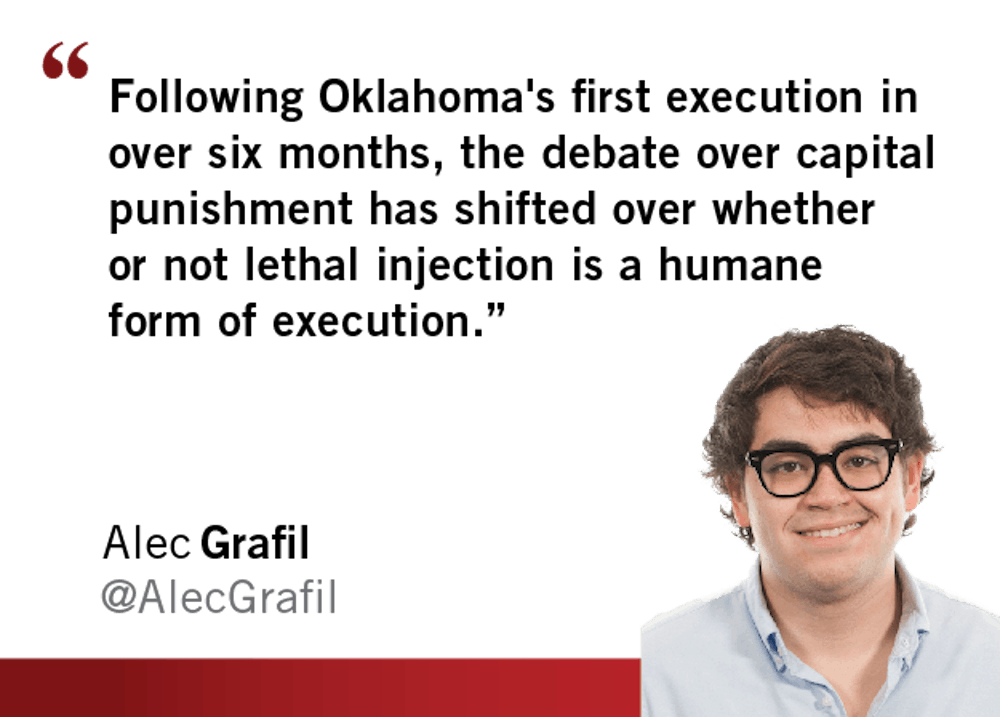With the execution of Charles Warner on Thursday, Oklahoma carried out its first execution in over eight months. This delay came after the botched April execution of Clayton Lockett. After several attempts to find a usable vein to insert the IV, the physician finally located one in the groin area. The execution went wrong when it was discovered that Lockett's vein had exploded and that he was still conscious. This led to Lockett writhing in pain before finally dying of a heart attack 43 minutes after the initial injection. These two executions initially sparked debate over the use of capital punishment, but the real debate should focus on the method of execution.
32 states still use the death penalty, and all 32 of them use lethal injection as their mode of execution.
Until recently, most states used a three- injection method: the first used for general anesthesia, the second being a muscle relaxer and the final drug stopping the heart. The recent discontinuation of this method came about when major pharmaceutical companies stopped selling the drugs needed to carry out executions.
To counteract this shortage, many states have had to turn to other less-regulated pharmaceutical companies. This turn has led to the emergence of several variations of one and two drug lethal injection methods. Many states, including Oklahoma, have also refused to disclose the cocktails being used in lethal injections. All of this has led to several botched executions and many court cases.
According to one Amherst study, 3 percent of all executions in the U.S. have been botched in some way. While this percentage is relatively low — considering the extreme pain one endures during a botched execution — that number is way too high.
In 2014 alone, there were 3 major botched executions including Ohio man Dennis McGuire, previously mentioned Oklahoman Clayton Lockett and local Arizonan Joseph R. Wood. According to witness at the Ohio execution, McGuire "gasped for air" for over 25 minutes before dying, all while making "choking sounds."
In July, Joseph R. Wood was executed at Florence State Prison in Arizona. The execution lasted one hour and 40 minutes. According to eye witnesses, Wood gasped for air for a majority of the duration of the execution, while state officials claim that he was simply snoring. All three of these cases clearly demonstrate how terribly wrong lethal injection can go.
With the increased number of botched executions, the question remains on how to humanely execute prisoners. Ironically enough the answer may come from a convicted murderer. During the 1990s, euthanasia activist Jack Kevorkian carried out 130 assisted suicides with the use of carbon monoxide. While the practice of assisted suicide remains a hotly debated subject, Kevorkian's long-time assistant firmly believes that carbon monoxide might be the most humane way of executing prisoners. Assistant Neal Nicol states that their method is "an extremely painless way of passing" and that "there are no twitches, movements, or signs of discomfort at all." While the idea of using Kevorkian's method may seem unethical, if there is any chance that it may help people pass more painlessly, the method should be explored further.
While the death of Clayton Lockett has rightly ignited the debate over the death penalty, the honest truth is that the U.S. will continue to execute prisoners for the foreseeable future. Lawyers and prisoners will continue to question the constitutionality of the death penalty and courts will continue to uphold the previous rulings. The case that should be made instead is that the current form of lethal injection is performed under less-than-ideal circumstances and should be considered a form of cruel and unusual punishment.
Reach the columnist at Alec.Grafil@asu.edu or follow @AlecGrafil on Twitter.
Editor’s note: The opinions presented in this column are the author’s and do not imply any endorsement from The State Press or its editors.
Want to join the conversation? Send an email to opiniondesk.statepress@gmail.com. Keep letters under 300 words and be sure to include your university affiliation. Anonymity will not be granted.
Like The State Press on Facebook and follow @statepress on Twitter.





